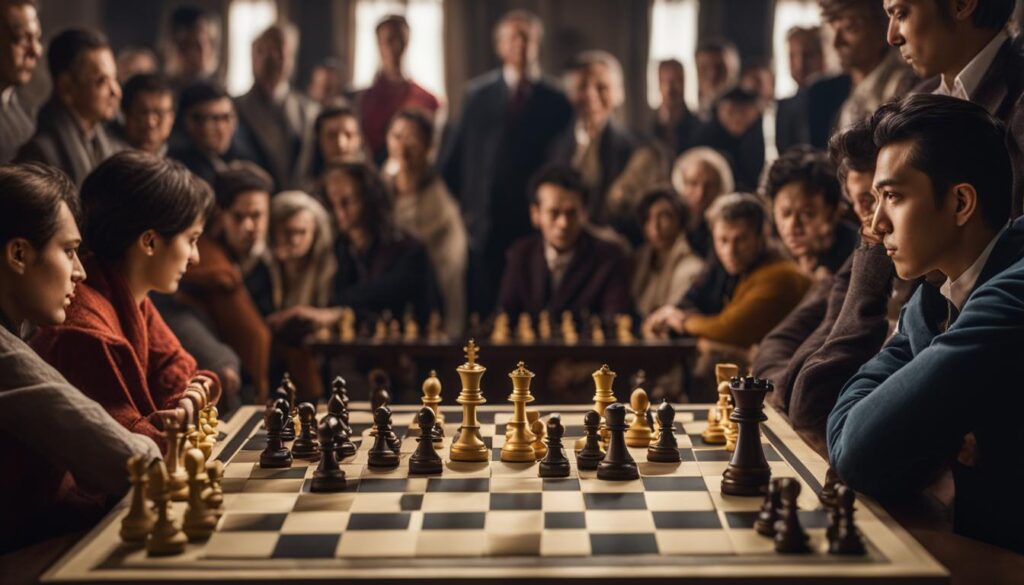We may earn money or products from the companies mentioned in this post.
If you’re a true lover of chess, there is no doubt that you’ve heard of the legendary matches between iconic Grandmasters. These historical chess games have been instrumental in shaping the game that we all know and love today. They offer invaluable insights into the thought process behind each move and the reasons that led to a particular strategy.
In this section, we’ll explore the fascinating world of historical chess game analysis. We’ll teach you how to analyze these games, identify patterns, and extract valuable insights. We’ll also discuss the importance of studying these games to improve your own chess skills.
Key Takeaways
- Historical chess games analysis can provide valuable insights into the game
- Analyzing historical games can help improve your own gameplay
- Studying historical games teaches you about historical strategies and tactics
- Understanding the thought process behind each move can help you develop your own strategic thinking
- Analyzing historical chess games is an exciting way to learn from the masters
Uncovering Tactics and Strategies
Historical chess games provide a wealth of insights into the tactics and strategies employed by legendary chess players. Analyzing these games can help you better understand the game of chess and improve your own gameplay. In this section, we will explore some of the most effective chess game analysis techniques to uncover these insights.
1. Analyzing Historical Chess Matches
The first step in analyzing historical chess games is to carefully study the moves made by each player. Review each move and consider the motivations behind them. What were the players trying to accomplish? Were they setting up for a specific attack or defense? By understanding the reasoning behind each move, you can gain a deeper understanding of the game and improve your own strategic planning.
To make this process more manageable, consider reviewing one game at a time. Take the time to fully analyze each move before moving on to the next. This will allow you to better understand the flow of the game and the reasoning behind each move.
2. Identifying Key Patterns
As you analyze historical chess games, keep an eye out for key patterns and recurring strategies. Look for common openings, maneuvers, and attacks that were used by successful players. By identifying these patterns, you can begin to incorporate them into your own gameplay and improve your overall skill level.
Additionally, it can be useful to identify the weaknesses in your own gameplay and look for patterns in how your opponents have taken advantage of these weaknesses in the past. By understanding your own weaknesses and how they have been exploited in the past, you can take steps to address these issues moving forward.
3. Using Chess Analysis Software
In addition to manual analysis, there are many tools and software available for chess analysis. These tools can help you quickly analyze game positions and identify key patterns and strategies. Some popular chess analysis software includes ChessBase, Fritz, and Houdini.
When using chess analysis software, it is important to understand the limitations of these tools. While they can be incredibly helpful in identifying key patterns and strategies, they do not replace the need for careful manual analysis and strategic thinking.
4. Incorporating Insights into Your Own Gameplay
Finally, as you analyze historical chess games and uncover valuable insights, it is essential to incorporate these insights into your own gameplay. By learning from the strategies and tactics employed by successful players of the past, you can improve your own gameplay and take your skills to the next level.
Remember, the key to success in chess is not just to learn from your own mistakes, but to learn from the successes of others. By utilizing the insights gained through historical chess game analysis, you can take your game to new heights of success.
Tools for Chess Analysis
If you’re serious about improving your chess game, it’s essential to analyze your moves and understand where you can improve. Fortunately, there are several tools and software available that can help you become a better chess player.
Chess Analysis Tools
One of the most popular tools for analyzing chess games is ChessBase. It’s a powerful database program that lets you store, organize, and analyze your games. It also provides access to a massive library of historical games, allowing you to study the moves of legendary Grandmasters.
Another useful tool is Chess.com’s game analysis feature. It’s an online platform that lets you upload your games and get an in-depth analysis of your moves. The analysis includes insights into where you made mistakes, where you missed opportunities, and where you can improve.
Chess Moves Analysis
Chess moves analysis is all about studying the moves made by Grandmasters in historical games. By analyzing these games, you can gain insights into the thought process behind each move and understand how different strategies were used to achieve victory.
To start analyzing historical games, you can use ChessBase or any other database program to access a library of games. From there, you can study the moves, evaluate the tactics and strategies employed, and learn from the best players in history.
Chess Game Analysis Software
In addition to ChessBase, there are several other software options available for chess game analysis. Stockfish is a popular chess engine that uses artificial intelligence to analyze games and provide feedback to players. It’s a powerful tool that can help you identify mistakes, evaluate your strategy, and improve your overall game.
Another option is Lichess. It’s a free online chess platform that includes analysis tools and a database of historical games. It’s a great resource for players of all levels who want to improve their game and learn from historical matches.
In Conclusion
Chess analysis tools, moves analysis, and game analysis software are essential for improving your chess game. By studying the moves of Grandmasters, evaluating your own gameplay, and utilizing powerful analysis tools, you can become a better player and take your game to the next level.
Analyzing Chess Strategies
When analyzing historical chess games, it’s important to pay close attention to the strategies employed by Grandmasters. Analyzing these strategies can provide valuable insights into how to think ahead and plan moves to achieve victory.
One effective way to analyze chess strategies is by breaking down the game into key moments and examining the thought process behind each move. Ask yourself why a particular move was made and what it accomplished in terms of the overall strategy. Look for patterns and recurring themes throughout the game that can provide clues to the Grandmaster’s overall strategy.
Example of Strategic Moves
Let’s take a look at a historical game between Bobby Fischer and Boris Spassky, played in 1972. In this game, Fischer employed a strategic move that ultimately helped him secure victory.
“16…exd5! 17. e5 d4!”
This move allowed Fischer to gain control of the center of the board and begin to push back Spassky’s pieces. By sacrificing his pawn, Fischer was able to open up avenues for his own pieces to move freely. This move was a crucial part of Fischer’s overall strategy to gain control of the board and eventually force Spassky into making a critical mistake.
Incorporating strategic moves like this into your own gameplay can give you an edge over your opponents and help you achieve victory.
Thinking Ahead
Another key aspect of analyzing chess strategies is learning how to think ahead. Grandmasters are able to anticipate their opponent’s moves and plan their own moves accordingly. By analyzing historical games, you can learn how to identify patterns and anticipate your opponent’s next moves.
To improve your own ability to think ahead, try playing through historical games and pausing at key moments to consider what move you would make and why. This exercise can help you develop a more strategic mindset and improve your overall gameplay.
By analyzing chess strategies from historical games, you can gain valuable insights into how to plan ahead, anticipate your opponent’s moves, and ultimately achieve victory.
The Secrets of Iconic Grandmasters
Exploring historical chess games and analyzing the moves of Grandmasters is a great way to gain new insights and improve your own gameplay. Let’s take a closer look at some of the secrets employed by iconic chess players.
“A strong memory, concentration, imagination, and a strong will – these are the traits required in chess.” – Garry Kasparov
Game Analysis
Analyzing historical chess matches is a valuable way to understand the strategies and thought processes of successful Grandmasters. By studying their moves, you can gain insights into how they approached different situations and learn to apply these same techniques to your own games.
One example is the legendary game played between Garry Kasparov and Veselin Topalov in 1999. Kasparov sacrificed his queen in the middle game to gain a strategic advantage. By carefully analyzing his thought process and the resulting moves, you can learn valuable lessons about strategic thinking and the importance of calculating risks and rewards.
Strategic Planning
Another key aspect of successful chess gameplay is strategic planning. In historical games, Grandmasters often employed specific strategies to gain an advantage. Analyzing these strategies can help you develop your own planning and decision-making abilities.
For example, Bobby Fischer’s famous game against Donald Byrne in 1956 showcased his use of the Sicilian Defense strategy. By studying his moves and analyzing the strategy behind his gameplay, you can gain insights into the importance of adaptability and the ability to think ahead.
Applying Insights to Your Own Gameplay
By analyzing historical chess games and uncovering the secrets of iconic Grandmasters, you can gain valuable insights and apply them to your own gameplay. Incorporating these strategic techniques and thought processes can help you become a more successful and skilled chess player.
So, dive deep into the world of historical chess games and discover the secrets of iconic Grandmasters. Analyze their moves, strategies, and decisions to gain valuable insights and improve your own gameplay.
Conclusion
As we conclude this guide, we hope you have gained a deeper appreciation for the importance of historical chess games analysis. Studying the games of iconic Grandmasters can help you to understand their thought processes, tactics, and strategies. This knowledge will allow you to improve your own gameplay and become a more skilled player.
Remember, historical chess games analysis is not just reserved for chess scholars and experts. It is a valuable tool that every chess player should incorporate into their training regimen. By analyzing past games, you can learn from the best and gain a competitive edge in your future matches.
Final Thoughts
Chess is a game of strategy, and historical chess games analysis gives you the opportunity to learn from the masters. By applying the techniques and insights gained from analyzing past games, you can improve your own gameplay and take your chess skills to the next level.
So, take some time to explore the fascinating world of historical chess games analysis. You might just discover something that could change your game forever.
SEO Keywords: Historical Chess Games Analysis
FAQ
What is historical chess game analysis?
Historical chess game analysis is the process of studying and analyzing chess games that have been played in the past by renowned players. It involves examining the moves, strategies, and decisions made by these players to gain valuable insights and enhance your own chess skills.
Why is historical chess game analysis important?
Historical chess game analysis is important because it allows you to learn from the masters and understand the thinking behind their moves. By studying these games, you can improve your tactical and strategic understanding, identify patterns, and develop your own unique playing style.
How can I analyze historical chess games effectively?
To analyze historical chess games effectively, it is recommended to carefully study each move, understand the reasons behind them, and note any recurring patterns or strategies. It is also helpful to use chess analysis tools and software to aid in the analysis and uncover deeper insights.
What tools and software are available for chess analysis?
There are several tools and software available for chess analysis, such as ChessBase, Stockfish, and Lichess. These tools provide features like move analysis, game database access, and position evaluation, helping you analyze games more efficiently and gain a better understanding of the strategic nuances.
How can analyzing historical chess games improve my own gameplay?
Analyzing historical chess games can improve your own gameplay by exposing you to different strategies, tactical patterns, and positional concepts. By studying the moves and decisions of the masters, you can expand your knowledge and apply these insights to your own games, making you a more well-rounded player.
Can analyzing historical chess games help me become a better chess player?
Yes, analyzing historical chess games can definitely help you become a better chess player. It provides a wealth of knowledge and inspiration, helping you improve your chess understanding, strategic thinking, and decision-making abilities. By learning from the best, you can enhance your skills and take your game to the next level.
Are there any specific historical chess games I should focus on?
While there are numerous historical chess games worth studying, it is recommended to focus on games played by iconic Grandmasters such as Garry Kasparov, Anatoly Karpov, Bobby Fischer, and Mikhail Tal. These players have left a significant impact on the chess world and analyzing their games can provide valuable insights.
Can analyzing historical chess games be enjoyable?
Absolutely! Analyzing historical chess games can be an enjoyable and intellectually stimulating activity. It allows you to delve into the minds of the greatest chess players in history and unravel the beauty and complexity of their moves. It is a rewarding experience that can deepen your appreciation for the game of chess.
Affiliate Disclosure: This post may contain affiliate links. If you purchase through our link, we may receive a small commission, but at no additional cost to you. For more information, please see our Disclosure statement.



